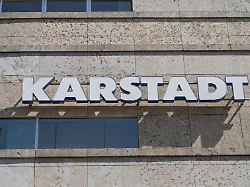Profitable Lufthansa rescue
Karstadt bankruptcy pushes Corona aid fund into the red
7/11/2023 7:54 p.m
With a billion-dollar fund, the federal government wants to get struggling companies through the corona pandemic. The WSF ended the past year with a loss. Although he earns at the Lufthansa rescue. But with the bankruptcy of the Karstadt chain, a lot of money is lost. The tax millions no longer helped others either.
The state corona rescue fund WSF was in the red in the past year in view of the difficulties at the department store group Galeria Karstadt Kaufhof. The net gain of 760 million euros from the sale of Lufthansa shares by the Economic Stabilization Fund (WSF) was not enough to recoup losses with Galeria and other bankruptcies or near-bankruptcies, according to the fund’s annual report.
Accordingly, the WSF had to give up hope of repaying most of the 680 million euros with which it supported the company of the Austrian real estate investor Rene Benko. According to the annual report, the WSF still expects 88 million euros from a secured subordinated loan, and further money could come from the realization of collateral. During the corona pandemic, the department store chain had twice taken refuge in protective shield proceedings under insolvency law.
The WSF ended 2022 with a loss of 26.3 million euros, after having earned 104.1 million euros the year before. In the first year of its existence in 2020, there was a minus of 25.9 million euros in the annual balance sheet. Last year, it had to write off EUR 710.2 million of the EUR 6.37 billion with which the WSF had supported 25 companies, primarily in tourism, retail and the automotive supply industry. 3.85 billion euros were repaid.
WSF money also helps with energy prices
The WSF also had to write off the aid for the shoe chain Görtz (28 million), which had slipped into bankruptcy, and the plastics technology specialist Frimo (ten million). Even with the travel agency chains FTI Touristik and Berge & Meer, to which more than 600 million euros flowed, the Corona fund has said goodbye to the fact that it can still get its money back in full. The travel group TUI, on the other hand, has now completely repaid its aid. However, the expected profit for the WSF of more than 600 million euros from this will not be available until 2023.
Since November, the WSF has also been supposed to help deal with the energy crisis, albeit indirectly via the state bank KfW. In the past year, she got almost 32 billion euros from the pot to support companies that are suffering from the high energy prices as a result of the Ukraine war or the consequences of the Corona crisis. 17 billion were repaid. For the WSF, however, this is only a transitory item and therefore has no effect on the result.
The fund was set up by the federal government shortly after the outbreak of the pandemic in spring 2020 in order to provide direct help to large companies that were in need due to the corona crisis, originally with a total amount of up to 600 billion euros. As part of the extension of the WSF, the total volume was adjusted to 250 billion euros as of January 1, 2022.
